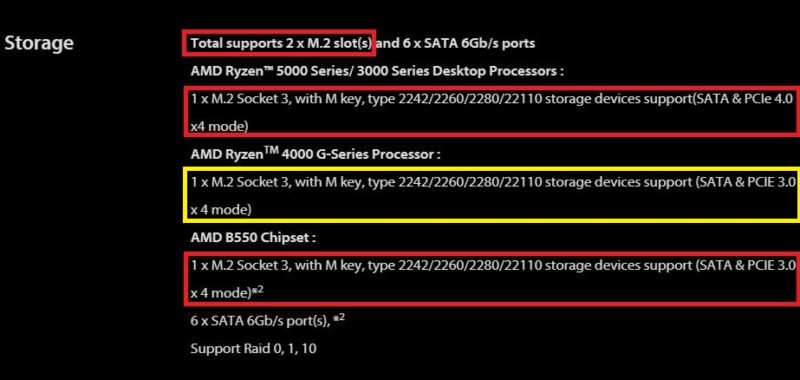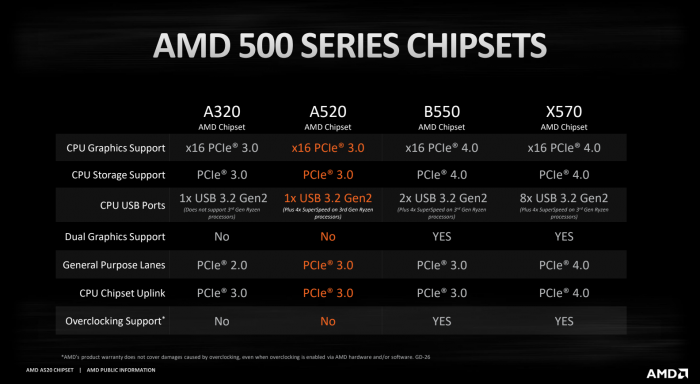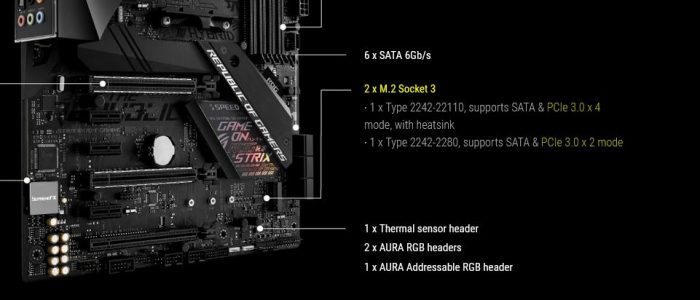NVMe SSDs are the new normal for being the primary hard drives for PC these days – even for PCs in the budget segment.
No longer are NVMe SSDs stupendously expensive and intended for high-performance builds.
Unfortunately, unlike the SATA Hard Disk Drives and SATA SSDs which connect to the SATA ports found in abundance on any given motherboard, NVMe SSDs require specialized and rarer NVMe-supported M.2 slots.
The silver lining is that almost all the newer motherboards, cheap and expensive, offer an M.2 slot supporting NVMe SSDs.
In this article, we will examine whether your motherboard supports NVMe SSDs. We will also learn how to figure out which generation of NVMe SSDs your motherboard supports.
The generation of NVMe SSDs your motherboard supports is an essential characteristic, as every new generation of NVMe SSDs significantly improves the transfer speed compared to the previous generation.
TABLE OF CONTENTS
Does My Motherboard Support NVMe SSD? – How to Check
The easiest way to know whether your motherboard supports NVMe SSD is to check the manufacturer’s spec sheet.
You must check the spec sheet’s storage or hard drive section to figure out what kind of drives it supports.
However, there are several caveats and details that you must be aware of when figuring out precisely what kind of SSDs your motherboard can support.
PCIe and SATA Interfaces
Learning about these two interfaces will help you understand the spec sheet better.
There are two interfaces used by hard drives: SATA and PCIe.
SATA is slower. The latest iteration SATA 3, has a max theoretical transfer speed of 6 Gbps or 750 MB/s second. This interface is used by spinning hard disk drives and SATA SSDs.
PCIe interface, on the other hand, utilizes the PCIe lanes. These are significantly faster. The NVMe SSDs use the PCIe interface.
PCIe gen 3 NVMe SSDs can reach typical speeds of 3500 MB/s, and the latest PCIe gen 4 NVMe SSDs can reach typical speeds of about 5500 MB/s.
Hence, it is important to note that “SATA” SSDs are NOT the same as “PCIe NVMe” SSDs!
Also, before checking the specs sheet, there is some jargon and nomenclature that you should keep in mind to avoid confusion:
- PCIe SSD is the SAME as NVMe SSD
- SATA 6b/s, SATA 6Gbps and SATA III, are all the same
Therefore, if the motherboard spec sheet reads as “supports PCIe SSD,” it is the same as saying that it supports NVMe SSD.
Example of a Motherboard Specsheet with M.2 NVMe Slots

The image above shows the excerpt of the spec sheet for ASUS B550-Plus Prime.
Here you can read that this motherboard supports 2 x M.2 slots. However, having the M.2 slots does not automatically mean that the motherboard offers support for NVMe SSDs.
For this, you have to read further below.
Reading further will reveal that this motherboard has 1 x M.2 slots connected to the CPU PCIe lanes and 1 x M.2 slot connected to the motherboard B550 chipset PCIe lanes.
Fortunately, for this motherboard, both of its M.2 slots support SATA and NVMe SSDs.
However, on some motherboards, the M.2 slot may ONLY support SATA SSD.
Also Read: How to Use Two M.2 SSD?
Generation of the NVMe Supported Depends on the Chipset and the CPU
You may have noticed in the spec sheet above that there are different sections for the CPU-supported NVMe M.2 slots.
I have marked them in red and yellow separately.
This is basically telling you that if you pair this motherboard with a Ryzen 5000 or 3000 series AMD CPU, then this particular slot WILL support 4th gen NVMe SSDs.
However, if you pair this motherboard with a 4000G series, 2000 series, or older AMD Ryzen CPUs, then this M.2 slot will only support the 3rd Gen SSDs.
Hence the choice of the CPU DOES matter for the type of NVMe SSD your motherboard can support.
Also Read: How to check PCI Express Slot Version?
The Motherboard Chipset Matters a Ton

As mentioned earlier, one of the M.2 NVMe slots on this motherboard is powered by its chipset.
In other words, the second M.2 slot connects to the chipset PCIe lanes.
Different motherboard chipsets conform to different PCIe versions. The chipset PCIe lanes for B550 conform to PCIe version 3.0. The X570 chipset, on the other hand, has chipset lanes conforming to PCIe version 4.0.

The chart above shows the PCIe version for the CPU and motherboard lanes(general purpose lanes) supported by different chipset models.
Again, the X570 chipset here is superior as it supports Gen 4 for CPU and chipset-connected M.2 NVMe slots.
Here is an example of an X570 motherboard’s spec sheet it clears shows as such:

Also Read: Can You Use a PCIe 4.0 SSD On Your Existing Motherboard?
What Generation of NVMe SSD Does My Motherboard Support? – Gen 4 vs Gen 3 NVMe SSDs
As discussed above, the generation of NVMe SSD your motherboard supports depends upon the chipset and the CPU.
There is a significant difference between Gen 4 and Gen 3 NVMe SSDs.
The Gen 3 SSDs, such as the Samsung 970 pro, conform to PCIe 3.0 protocol, whereas the Gen 4 SSDs, such as the Samsung 980 Pro, conform to PCIe 4,0 protocol.
A Gen 3 SSD can reach speeds of about 3500 MB/s. Gen 4 SSDs, on the other hand, can read 5500 MB/s transfer speeds.
Techspot has a great article on PCIe V4.0 vs. 3.0 SSDs if you are interested in benchmarks.
However, at the moment, only a handful of motherboards support Gen 4 NVMe SSDs.
For AMD, the following chipsets support Gen 4 SSDs:
- AMD X570: Premium Chipset with both CPU and Chipset lanes conforming to V4.0.
- AMD B550: Mid Range Chipset with only the CPU lanes conforming to V4.0.
Intel has several chipsets at the moment that can support Gen 4 SSDs.
- Intel Z690: Premium Chipset with CPU and chipset lanes support Gen 4 SSDs
- Intel H670: Similar to Z690
- Intel B560: Only CPU connected M.2 slot support Gen 4 SSD
- Intel Z590: Premium Chipset – but only CPU lanes conform to PCIe V4.0 – hence it can only support a single V4.0 M.2 slot.
- Intel B560: A mid-range chipset with support for a single V4.0 M.2 slot
- Intel H570: Another mid-range chipset with support for a single V4.0 M.2 slot.
Also Read: PCIe 3.0 vs. 2.0 – What is the Difference?
Sizes of the NVMe SSDs Supported
The spec sheet talks about the sizes of the SSDs each M.2 slot can support, i.e., 2242/2260/2280/22110.
Here the first two digits indicate the width of the SSD in millimeters, and the last 2-3 numbers indicate the length of the SSDs in millimeters the slot supports.
So 2242 means an SSD with a 22 mm width and 42 mm length.
Also Read: How to Check What Motherboard You Have?
M.2 NVMe Slots Can Also Be Clocked Down to Half Performance!
An M.2 slot uses 4 PCIe lanes, ideally. An NVMe SSD to perform at its full potential requires 4 PCIe lanes.
However, the M.2 slot may only be connected to two PCIe lanes on certain motherboards.

For instance, the motherboard above has two M.2 slots. One of them is connected to full 4 x PCIe lanes. However, the second M.2 slot only connects to two PCIe lanes.
An x2 M.2 slot would halve the transfer speeds of the NVMe SSD. Thus significantly bottlenecking the performance.
Here is another example:

Notice that the spec sheet has an “x2 PCIe Mode” highlighted for its M.2 slot, indicating that an NVMe SSD on this motherboard would only operate at half its rated speeds.
Also Read: Can You Upgrade CPU Without Changing the Motherboard?
Final Words
There is no substitute for reading the spec sheet. Therefore, the correct answer to the question “does my motherboard support NVMe SSD?” is that you should refer to the technical spec sheet of the motherboard.
In the above text, I highlighted all the small details, jargon, and important characteristics you should look for when reading the motherboard spec sheet to select the right NVMe SSD for your PC.
You can also use the same concepts highlighted above to check the details for the M.2 slot on your motherboard.
Also Read: Does SSD Need Power?
FREQUENTLY ASKED QUESTIONS
1. Are there any compatibility issues I should be aware of when installing an NVMe SSD on my motherboard?
While most modern motherboards do support NVMe SSDs, it’s important to check the motherboard specifications to ensure compatibility. Some older motherboards may not support NVMe, or may only support certain NVMe SSD models or brands.
2. Do all NVMe SSDs work with all motherboards that support NVMe?
While most NVMe SSDs are compatible with motherboards that support NVMe, it’s important to check the motherboard specifications and the NVMe SSD specifications to ensure compatibility.
Some NVMe SSDs may require certain features or settings on the motherboard to function properly.
3. If my motherboard doesn’t support NVMe SSDs, what are my options for upgrading?
If your motherboard doesn’t support NVMe SSDs, you may still be able to upgrade your storage by installing a PCIe adapter card that supports NVMe.
This will allow you to connect the NVMe SSD to the adapter card, which will then connect to an available PCIe slot on your motherboard.
4. Will I need to update my motherboard’s firmware or BIOS before installing an NVMe SSD?
Depending on your motherboard and the specific NVMe SSD you are installing, you may need to update your motherboard’s firmware or BIOS before installing the NVMe SSD.
This is especially true if your motherboard is older or doesn’t have native support for NVMe SSDs.
Consult the motherboard manual or manufacturer website for instructions on updating the firmware or BIOS.

amar m/b intel 4 gen proc. i5
m.2 port suported kina bujhtesi na
My knowledge of your language is limited, but I believe you are speaking in Bengali. It would help if you can write in English.
I think what you are asking is if an M.2 port is supported on your PC. The answer to that depends upon what motherboard you have. If you can tell me the make and model of your motherboard or a bit more detail regarding your PC/laptop I would be able to help.
WIll a M.2 PCI Express® 3.1a, NVM Express™ 1.3c work on a Motherboard ATX Gigabyte Z370 AORUS Gaming 5?
Absolutely. I don t see any reason why it won’t. PCIe interface is backward and forward compatible.
Hello and thank you for the article. its very helpful! I have a Q: Can a ASUS H97-PLUS motherboard support a Western Digital Blue SN570 SSD M.2 NVMe PCI Express 3.0 ? I combine with a INTEL CORE I5-4590S CPU.
Hi. Thanks for stopping by. So yes, the motherboard CAN support the SSD. However, not to its full potential. According to certain listings, the M.2 slot on this motherboard supports upto 10 Gbps transfer rate which translates to about 1.25 GB/s speeds. This is much lower than what a PCIe 3.0 NVMe SSD can potentially achieve.
I did not know if it supports the NVMe protocol, so thank you for your answer 😀 I understand that it limits the capabilities of the ssd but I was thinking that I might use it in the future in another set up. Cheers
HP Pavilion – 15-ec1024ax supports gen 3 or gen 4 ssd?
Gen 3
Hi,
Great article.
Bought my laptop in 2017, Acer Aspire F15 F5-573G-59V4
&
I have upgraded with a 8gb ram, totalling 12gb ddr4 ram.
Would be great help if you could tell me,
1) which nvme sdd (around 250gb) to get installed to get the best results?
2) can the bios be updated & how to update?
2021 Asus TUF Gaming FX506 i7-11800H RTX 3050 support nvme gen4 or not?
hi
does HP Envy–15-k009ne supports Nvme SSD?
if yes, please tell the generation?
if no, please tell what type of SSD it supports?
Re: NVME compliance
With: GA-H97-D3H (rev. 1.0)
April 06, 2022
Good morning Atif Qazi
Of all the “expert” advise from; Gigabyte, Crucial, Samsung, Toms Hardware, Quoara, etc., the subjects which you discuss here are the most germaine in dtermining NVME compatability. Congratulations!
Hundred plus hours have been vested into seeking compatability answers; perhaps you can deliver one in a few minutes. As reference, have pasted below, relevant, slot/ storage data from the spec page.
My plan is to update an existing HDD system with two M.2 NVME drives (both samsung evo plus gen 3.0 drives). The first drive is for a Linux OS, the other is for data. The
OS drive will go to the native M.2 slot. The data drive will be placed into the x4 slot, via adapter. Or if necessary, will plug into PCIe x16 slot if the X4 is not compatible.
Do you know, or advise, if the Gigabyte H97-D3H (rev. 1.0)
board supports NVME gen 3.0 drives? If so, which slots are recognized (m.2, x16, x4) and will each run at full speed? If not full speed, will nvme drives run faster than a Sata SSD in the same slot?
If slots are NVME compliant, the bios will likely need upgrading, what about drivers?
Thank-you for consider my query,
john
Here is relevant paste from the spec sheet:
https://www.gigabyte.com/Motherboard/GA-H97-D3H-rev-10/sp#sp
1 x PCI Express x16 slot, running at x16 (PCIEX16)
(The PCIEX16 slot conforms to PCI Express 3.0 standard.) * For optimum performance, if only one PCI Express graphics card is to be installed, be sure to install it in the PCIEX16 slot.
1 x PCI Express x16 slot, running at x4 (PCIEX4) * The PCIEX4 slot shares bandwidth with all PCI Express x1 slots. All PCI Express x1 slots will become unavailable when a PCIe x4 expansion card is installed. * When installing a x8 or above card in the PCIEX4 slot, make sure to set PCIE Slot Configuration in BIOS Setup to x4. (Refer to Chapter 2, “BIOS Setup,” “Peripherals,” for more information.)
1x 1 x M.2 PCIe connector
(Socket 3, M key, type 2242/2260/2280 SATA & PCIe SSD support)
As far as I can tell, only the first x16 slot conforms to PCIe gen 3. The rest of the PCIe lanes are 2.0, hence this leads me to believe that the M.2 also conforms to PCIe 2.0. So, the Gen 3 SSD will work but at much slower speeds. It should still be faster than SATA though.
My MOBO is MSI X570 gaming pro carbon wifi with pcie gen 4. Spec given on mobo box is limited. I am using 970 EVO pro gen 3 Nvme, want to upgrade to 980 evo pro. Will the mobo support gen 3 and gen 4 at the same time with 3950X cpu. Will there be any issues if used on m.2 slot 1 & 2 at the same time.
Yes, they should work without any issues.
The motherboard specs does give comprehensive details here.
HP 17-by2010ca ?
How to define that which barebone or mother board support ssd m.2 or ssd NVMe? Please explain if there is any solution.
Sorry to be a bother.
But after hours of trying to figure this out, decided to ask.
My motherboard is B360MHD pro 2 version 6.
I want to make sure it can support a NVMe in particular: Hikvision E1000 1024GB NVMe M.2 PCIe SSD | HS‐SSD‐E1000/1024GB
The confusing part is that in its spec sheet it doesn’t clearly say it supports Nvme. https://www.biostar.com.tw/app/en/mb/export/spec_export.php?S_ID=917
But here https://www.biostar.com.tw/app/en/mb/introduction.php?S_ID=917
In the image it says 1 x PCIe M.2 Key M Slot.
Can you please confirm?
Hi, so as far as I can tell. The specsheet says “1 x M.2 (M Key) 32Gb/s Connector, support SATA III (6Gb/s)”
The key aspect here being the 32Gb/s, which roughly corresponds to 4 GB/s.
So an M.2 slot has four PCIe lanes (in most cases). 4 x PCIe lanes corresponding to Version 3.0 equate to ~ 4 GB/s. Which indicates that the M.2 slot you have conforms to PCIe 3.0. (Read this page PCIe Express scroll down to the table where it shows different versions and their x4 throughput rate.
NVMe and PCIe SSDs are terms used interchangeably. The NVMe SSD you have also conforms to PCIe 3.0 as far as I can tell.
So long story short, the M.2 slot and the NVMe SSD you have are both Gen 3 and should work.
Thank you very much for the detailed and quick reply. I really appreciate that you take the time to help people.
Hi Atif
can you tell me if Hp envy-23 n011na supports M.2
my motherboard is LGA1150
Thanks
Hi Atif,
Thank you so much for your article. Unfortunately, I am still not sure if my desktop can “afford” an SSD upgrade without any complications…
I have a Gigabyte GA-B75M-HD3 with an Intel i5-2400 @3.1 ghz.
Would it work if I use a PCIe adapter for an SSD to replace my ageing HDD? If yes, would the size (capacity) of the SSD matter, or have an impact as well?
Appreciate your kind response to my query.
Thank you.
Cheers!
Yes, you will need to utilize the x16 slot for your expansion card. Your x16 slot conforms to PCIe version 3.0, hence, make sure you get a PCIe adapter and an SSD that also conforms to PCIe 3.0.